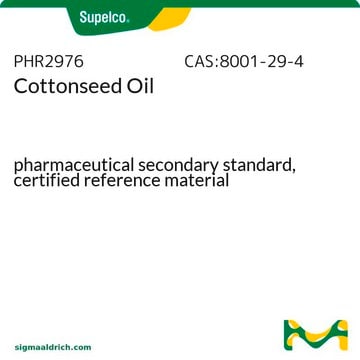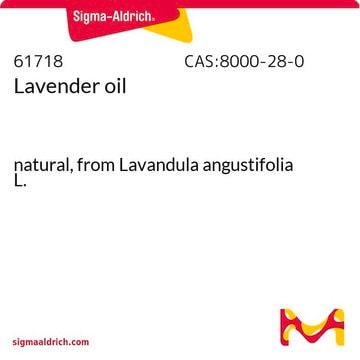Recommended Products
biological source
plant (Gossypium hirsutum L.)
form
liquid
composition
unsaturated fatty acids, ~70%
density
0.92 g/mL at 25 °C (lit.)
lipid type
oils
shipped in
ambient
storage temp.
room temp
Looking for similar products? Visit Product Comparison Guide
General description
Cottonseed oil is extracted from the kernel, a part of the cotton seed. This oil contains linoleic acid, oleic acid, linolenic acid and myristic acid. It is used as non-edible oil and is used in the preparation of polymeric resins.
Cottonseed oil is extracted from the seeds of Gossypium sp. It is used to impart a roasted or nutty aroma to fried food products. Cottonseed oil is used as a component to formulate shortenings and margarines. It has a long shelf life and is healthy for the heart.
Application
Cottonseed oil has been used as an nutritional supplement for alveolar septal wall thickness in mice. It has been used to study its effects on indirect gestational and lactational exposure in rats.
Cottonseed oil has been used to dissolve testosterone propionate employed in preparation of prenatal testosterone -treated Suffolk ewes.
Storage Class Code
10 - Combustible liquids
WGK
awg
Flash Point(F)
Not applicable
Flash Point(C)
Not applicable
Personal Protective Equipment
dust mask type N95 (US), Eyeshields, Gloves
Certificates of Analysis (COA)
Search for Certificates of Analysis (COA) by entering the products Lot/Batch Number. Lot and Batch Numbers can be found on a product’s label following the words ‘Lot’ or ‘Batch’.
Already Own This Product?
Find documentation for the products that you have recently purchased in the Document Library.
Customers Also Viewed
Technological Innovations in Major World Oil Crops, Volume 1: Breeding (2011)
Vegetable Oils in Food Technology: Composition, Properties and Uses (2011)
Modelling bronchopulmonary dysplasia in mice: how much oxygen is enough?
Nardiello C, et al.
Disease models & mechanisms, dmm-027086 (2016)
Virender K Rehan et al.
American journal of physiology. Lung cellular and molecular physiology, 299(5), L672-L680 (2010-08-24)
The physiological development and homeostasis of the lung alveolus is determined by the expression of peroxisome proliferator-activated receptor-γ (PPAR-γ) by the interstitial lipofibroblast. We have recently shown (Dasgupta C et al., Am J Physiol Lung Cell Mol Physiol 296: L1031-L1041
Effects of environmental endocrine disruptors, including insecticides used for malaria vector control on reproductive parameters of male rats
Patrick SM, et al.
Reproductive Toxicology, 61, 19-27 (2016)
Our team of scientists has experience in all areas of research including Life Science, Material Science, Chemical Synthesis, Chromatography, Analytical and many others.
Contact Technical Service








